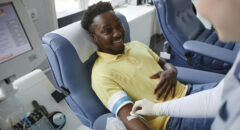
It’s estimated that 1 in 8 American men will be diagnosed with prostate cancer annually. The odds are even higher for Black men as they’re more likely to not only be diagnosed with the illness but also to die from it. While there are certain risk factors for prostate cancer that are outside of your control, there are a few that you can easily address. By tackling these areas, you can significantly reduce your likelihood of developing the disease.
1. Make Exercising A Habit
The benefits of exercise are almost too many to count. Fortunately, reducing your risk of prostate cancer is on the list.
If you haven’t been physically active for a while, it’s a good idea to get back into it slowly. Swimming, walking, jogging, and cycling are great options. Don’t shy away from getting others involved either. Group activities can help with sticking to exercise goals.
2. Pay Attention To Your Diet
What you eat can help or hurt when it comes to prostate cancer risk. A diet that’s high in fresh fruits, vegetables, whole grains, and healthy fats has been shown to be beneficial while dairy products should be avoided.
Foods that are high in lycopene are also great for lowering the risk of prostate cancer so eat a lot of tomatoes and watermelons. Finally, isoflavones have been shown to have a similar benefit and can be found in tofu, peanuts, chickpeas, as well as lentils.
RELATED: Prostate Cancer Symptoms & Treatment
3. Be Careful With Those Supplements
Supplements are usually a good way to ensure that you’re getting all the nutrients you need but they’re not created equal.
Some studies have shown that men who take Vitamin E alone tend to have a higher risk of prostate cancer. If you take 1mg of folic acid, you may also be at risk. Calcium may have a similar effect but on a much smaller scale. To be safe, talk to your doctor before adding any supplements to your routine.
4. Smoking Is Not Your Friend
Statistics show that people who smoke have a much higher chance of developing prostate cancer. If you quit, though, the risk starts to decrease fairly quickly. After a decade of not smoking, your odds of getting the disease will be in the same bracket as someone who has never smoked. It’s understandable if you have difficulty quitting so talk to your doctor about what can help.
5. Coffee Can Be Good For You
It’s been said that every three cups of coffee can reduce your risk of prostate cancer by as much as 11%. Of course, you have to weigh the benefits of the added caffeine against the health issues that are associated with it. If in doubt, talk to your doctor.
6. Maintain A Healthy Weight
Being overweight is another issue that is commonly associated with an increased risk of prostate cancer. While eating healthily and exercising should be enough to maintain your ideal weight, that’s not always the case.
You may need a more specialized diet or exercise routine to keep things under control so look into the options that work best for you.
Day 1: Just Diagnosed with Prostate Cancer
7. Don’t Skip Your Doctor’s Visits
Regular doctor’s visits are a key part of ensuring that you stay healthy. Even though you’re doing everything you can to prevent prostate cancer, that doesn’t mean it can’t still happen. That’s why your doctor will conduct a prostate exam and other tests whenever necessary to check what’s going on with your health. These exams will catch even the early stages of the disease.
8. Keep An Eye On Clinical Trials
Most people think that clinical trials are only concerned with treating diseases, but that’s not always the case. When it comes to cancer, doctors are as interested in preventing the illness as they are in effectively treating it.
Check government health websites to find the right clinical trials that might suit you.
Since there are different risk factors that can lead to prostate cancer, it’s hard to say that you can completely prevent it. However, if you take care of yourself and see your doctor regularly, it’s possible to keep healthy or at least, catch the disease in its early stages. As with all forms of cancer, an early diagnosis typically leads to a more positive result.








